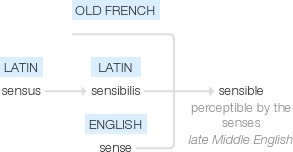Sensible
late Middle English (also in the sense ‘perceptible by the senses’): from Old French, or from Latin sensibilis, from sensus (see sense).
wiktionary
From Latin sēnsibilis(“perceptible by the senses, having feeling, sensible”), from sentiō(“to feel, perceive”).
etymonline
sensible (adj.)
late 14c., "capable of sensation or feeling;" also "capable of being sensed or felt, perceptible to the senses," hence "easily understood; logical, reasonable," from Late Latin sensibilis "having feeling: perceptible by the senses," from sensus, past participle of sentire "perceive, feel" (see sense (n.)). Of persons, "aware, cognizant (of something)" early 15c.; "having good sense, capable of reasoning, discerning, clever," mid-15c. Of clothes, shoes, etc., "practical rather than fashionable" it is attested from 1855.
Other Middle English senses included "susceptible to injury or pain" (early 15c., now gone with sensitive); "worldly, temporal, outward" (c. 1400); "carnal, unspiritual" (early 15c., now gone with sensual). Related: Sensibleness.
